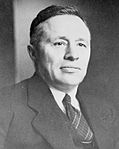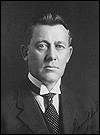| |||||||||||||||||||||||||||||||||||||||||||||||||
55 seats in the Legislative Assembly of Saskatchewan 28 seats needed for a majority | |||||||||||||||||||||||||||||||||||||||||||||||||
|---|---|---|---|---|---|---|---|---|---|---|---|---|---|---|---|---|---|---|---|---|---|---|---|---|---|---|---|---|---|---|---|---|---|---|---|---|---|---|---|---|---|---|---|---|---|---|---|---|---|
| |||||||||||||||||||||||||||||||||||||||||||||||||
| |||||||||||||||||||||||||||||||||||||||||||||||||
The 1934 Saskatchewan general election was held on June 19, 1934, to elect members of the Legislative Assembly of Saskatchewan.
The Liberal Party of former premier James Gardiner was returned to power with a large majority – 50 of the 55 seats in the legislature – after the four year Conservative minority government interlude.
After forming a coalition government to oust the Liberals from power after the 1929 election, James T.M. Anderson's Conservative government had tried to use anti-Catholic and anti-French Canadian feeling in the province to win support. The Conservatives also had the support of the Ku Klux Klan, which was a significant force in the province at the time.[1][2][3] The Tories also had to contend with the effects of the Great Depression and the prairie Dust Bowl, however; and although they won about a quarter of the popular vote, they won no seats in the legislature. The Conservatives remained a minor force in Saskatchewan politics for 40 years after this defeat.
The Tories' allies in the previous legislature – the Progressives – did not nominate candidates in this election, and were replaced by Farmer-Labour candidates as the voice of the Left in the province.
- ^ Latimer, Kendall (August 18, 2017). "KKK history challenges idea Sask. always welcomed newcomers: expert". CBC Saskatchewan. Retrieved August 20, 2021.
- ^ Kyba, Patrick (2006). "Ku Klux Klan". In Canadian Plains Research Center (ed.). Encyclopedia of Saskatchewan. Regina, Saskatchewan: University of Regina. Archived from the original on January 19, 2016. Retrieved September 13, 2010.
- ^ Weedmark, Kevin. "When the KKK rode high across the Prairies" Archived 2009-02-07 at the Wayback Machine. Moosomin World-Spectator.


